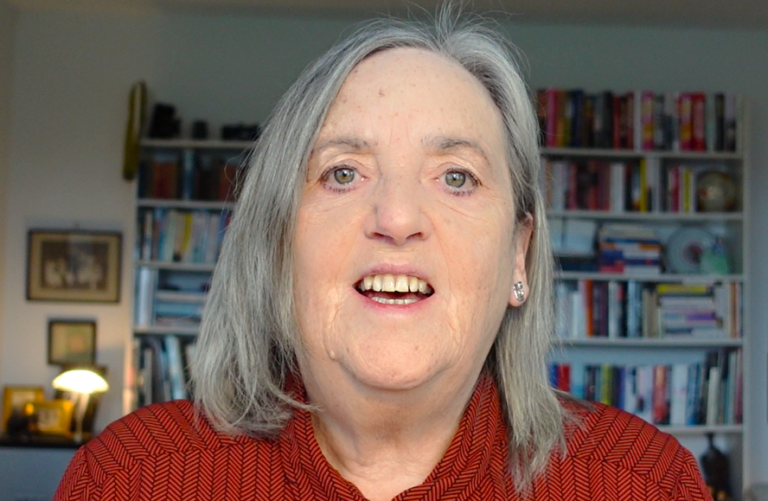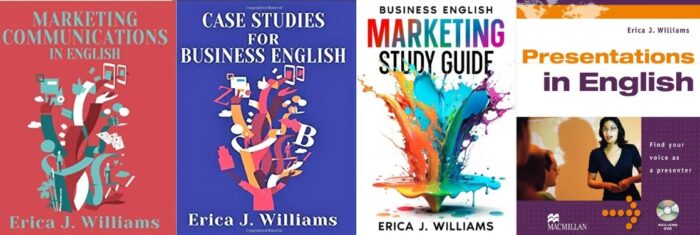BEST GRADES
ABOUT
Erica J Williams

Business English specialist with postgraduate qualifications in Management (Sales & Marketing) & Teaching English for Business (TEB); also qualified as an accredited practitioner coach.
Owner of a corporate training, consultancy & coaching business for over 20 years with training experience in various commercial sectors, particularly in the marketing communications industry.
Senior lecturer responsible for the design and teaching of the Business English programme in a German university for 13 years; diverse posts as a part-time & guest lecturer for Business English in Germany, Austria and the UK.

BUSINESS ENGLISH: MY THOUGHTS
I’ve been involved with Business English since its early pioneering days when it emerged as a subset of Teaching English as a Foreign Language (EFL) as a response to the growing trend of business to adopt English. In those early days, there was much discussion of what Business English actually was and what should be covered on courses. It was frequently dismissed as a niche unworthy of serious consideration.
Since that time, the English language has gone on an exciting journey into unexplored territory. Already an international language, English has become the world’s global language in this century with business as one of the main drivers of this growth. There is increasing discussion of BELF (Business English as a Lingua Franca) and the niche of Business English is more important and relevant that it has ever been.
So, what should be included in a course today?
I would include:
- the language of business topics
- the teaching and training of business communication skills such as presentations
- intercultural issues and training
- the examination of issues surrounding the development of English as the global language of business.
Business English is now a global business tool that belongs to all of us. It is neutral, beyond culture and its use and application can have little to do with native speaker standards. Many of my university students learnt from me as a native speaker but these students may never do business with a native speaker in their careers while communicating in English. There have been many arguments over the years that native speakers need to learn global Business English in order to trade globally. I would tend to agree with these arguments.
Business English has developed as an academic discipline more recently, again in answer to what was and is actually happening in business. Companies and organisations need graduates to be ready for the workplace and Business English courses in universities are required in order to prepare students accordingly. At the same time, courses have to fit into the academic curriculum. It is often difficult to know what the assessment standards should be and different lecturers can be using different standards in the same university. I understand the arguments that state that there is decreasing relevance of assessing using native speaker standards and fully accept that non-native speakers have a role to play as teachers.
Everything about Business English in higher education is a fine balancing act and my own approach has evolved accordingly. A lot depends on the communication scenario itself. For instance, grammatical accuracy is much more important in a written report than in a presentation. A non-native speaker at a lower intermediate level is certainly capable of giving a better presentation than a native speaker who has learnt nothing about communication or structuring and delivering a presentation. Assessing a student presentation by listing grammatical errors is thus a fruitless exercise in my opinion.
So, my approach is increasingly to adapt to English as a global language and to develop critical thinking, flexibility and creativity to help students enter the workplace with confidence and practical skills.
It is difficult to know how the world will change but I believe that English is at the point of no return and today’s students and probably their children and even their grandchildren will be using English. The importance of Business English cannot and should not be underestimated. Technology, communication tools and the workplace change constantly. We don’t know how the world of work will look in 50 or 100 years but I would be happy to take a bet that English will be a constant and everyone will be communicating in English to some extent.
MY COURSES: WHAT STUDENTS THOUGHT
“Thanks for all the things you taught me. I especially enjoyed your lessons as we were encouraged to be ourselves and get really creative. You allowed us to create bodies of work that I’m proud of and will still look at in the future. “
” This semester is by far the best English semester I ever had – I really love doing presentations and I like the way how you let us do them. The English lectures were my highlight during my semester. Thanks for that.”
“Your courses improved my presentation skills significantly and brought my written and verbal English skills to a professional level. I gained relevant insight on intercultural communication to a point where I feel comfortable conversing and connecting with people from all over the world. “
“You showed me the power of using effective language and how small adjustments can have a big impact. Your explanations always stuck with me – I “field tested” some of them in a professional environment and it is almost ridiculous how much of an effect they can have when utilized correctly.”
“I thought I would use the occasion to thank you again for being such a great teacher. Honestly, your courses were among the hardest ones for me but also taught me many things that I will remember and make use of throughout my whole career. Thank you for always pushing us to be better.”
“I feel like sometimes we don’t see the value of a teaching until we actually need to use it.
I am more than grateful for everything I was able to learn in your class. … Personally, it isn’t often that a certain teaching/teacher impacts one for life, yet you have done so. I will always remember my English teacher from Uni …”